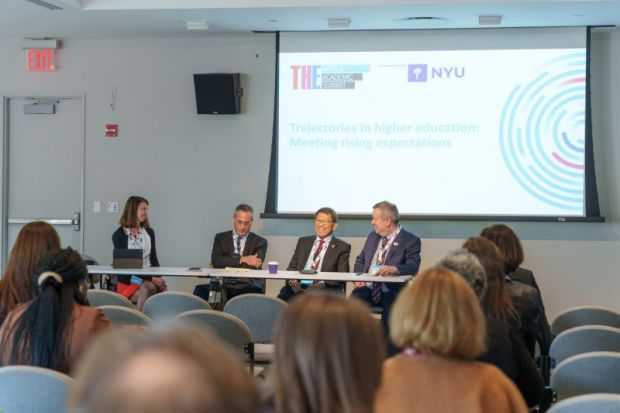US university leaders must acknowledge that it is “time to stop giving the warning about the risk of a two-tier higher education system, and admit that is now the reality”, according to the president of the country’s largest library system.
Anthony Marx, president of the New York Public Library and a former president of Amherst College, a private liberal arts college in Massachusetts, told the Times Higher Education World Academic Summit that US higher education was suffering from a “loss of trust that is true of almost all institutions” in today’s politically polarised environment.
But in the case of universities, he said, there was a case to answer, because as a sector higher education was too comfortable with a status quo that was now “broken”.
“We’re very critical thinkers, but the system is serving each constituency’s interests, and as a lapsed social scientist, I can tell you that’s not an ingredient for reform,” he said.
“What we need are public schools that feed [universities] quality students – that’s not the case in the US at this point. Then we need to provide free access to high-quality higher education.”
Lamenting an excessive focus on a small number of elite institutions, he said the result was that “our community colleges are forgotten”.
“We talk about the elites as if that’s where the students are. That isn’t where the students are,” he said.
“When I was president of Amherst I agreed to chair a commission on the future of community colleges, and people looked at me like I was crazy – why would you pay attention to the community colleges? But there are millions of students graduating a year, and we are ignoring them.”
Singled out for particular criticism was the overbearing influence in US higher education of domestic rankings systems with what Dr Marx described as “metrics that do not encourage education – the key metric in the US asks how much money do you have, and how many students can you say ‘no’ to? There isn’t an educational metric in that thing [the US News and World Report rankings], and it drives the industry.”
He went on to warn that universities were failing to keep pace with the changing demands and expectations of industry.
“Now we are at a moment when skills are changing and needs are changing, and the norms have to change, the assumptions of credentials are going to have to change,” he said.
“It’s just not going to work otherwise, it’s going to break. [Employers] are going to say, we can’t keep justifying only hiring people with a certain credential that doesn’t help us because there’s a monopoly.
“This is true of so many industries at this point – where [what universities are doing] doesn’t serve the industry, it just serves higher education institutions. And then we wonder about trust. When we serve ourselves, rather than society, we violate that trust.”
Speaking at the same session, Rocky Tuan, vice-chancellor of the Chinese University of Hong Kong, referred to an earlier presentation by the Harvard University economist Raj Chetty, which showed a strong correlation between family wealth and a student’s chances of leaving university and securing a top-paying job – even when controlled for factors such as SAT scores.
As someone who had spent four decades living in the US before moving to Hong Kong, Professor Tuan said the data presented by Professor Chetty had “catapulted me back into American reality”.
“In CUHK, one-third of our students are from families below the poverty line. Yet we are also a comprehensive research university. Many of them do very well – so what are we doing right in Hong Kong, and what is going wrong in America?” he asked.
“I think the key is that our universities, the good ones, are all public universities. The private universities are less competitive. More than 70 per cent of our funding [at CUHK] comes straight from government, whereas in the US state institutions are lucky if they get 20 per cent.”
Returning to Dr Marx, session moderator Scott Jaschik, editor of Inside Higher Ed, asked whether he thought that there was any chance of his vision for free public higher education becoming a reality.
“No, I don’t,” Dr Marx replied. “Americans don’t understand, and politicians don’t even talk about, education as the primary investment in the future. It isn’t even debated at any level.
“That’s really quite extraordinary, and I worry it is partly because the people with the most wherewithal to make the most noise are OK with the system.”
Asked about Joe Biden’s loan forgiveness policy, he added: “The initial reaction is the hacks saying it’s letting people off the hook, or it’s going to bankrupt the country, but we built a system that depends on loans to fund it, and the federal government guarantees that the loan companies are making money hand over fist by definition.
“Then we tell kids that we want you to get an education so you can do whatever you’re inspired to do, whatever you’re passionate about, [within] a system that gives them a level of debt so crushing that they can’t possibly do that.
“Again, the kids are losing faith in us – they see it.”




